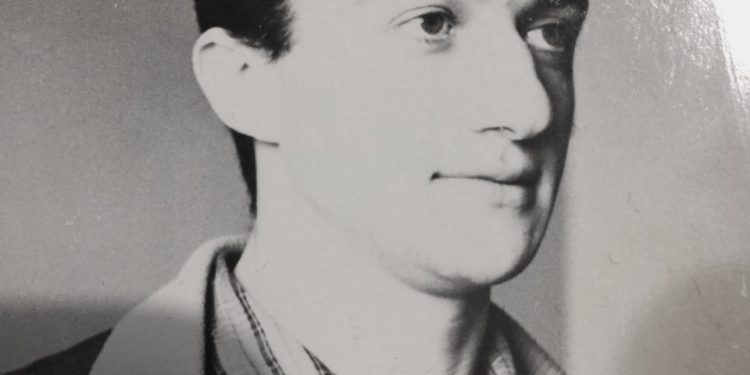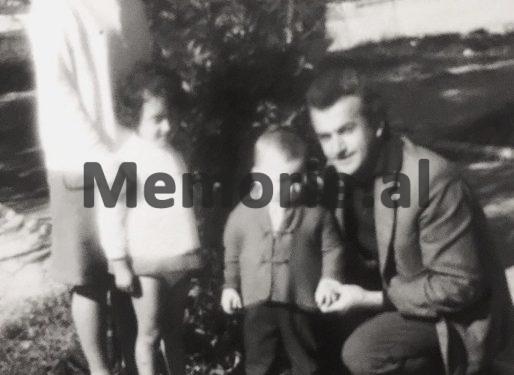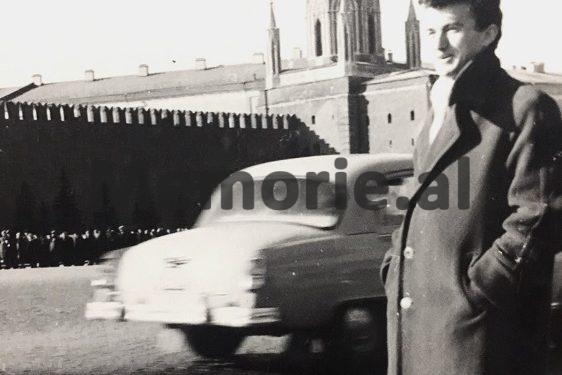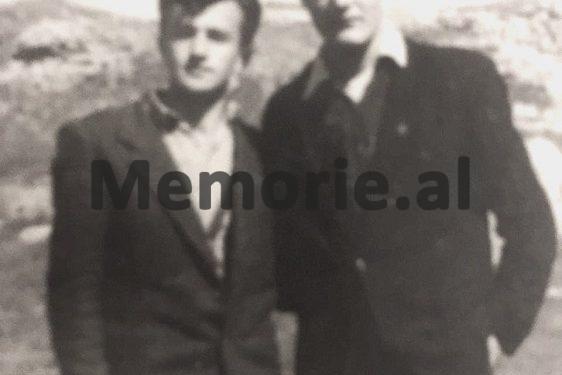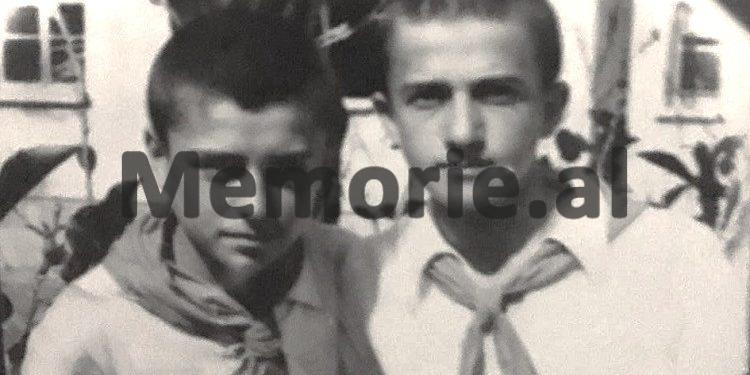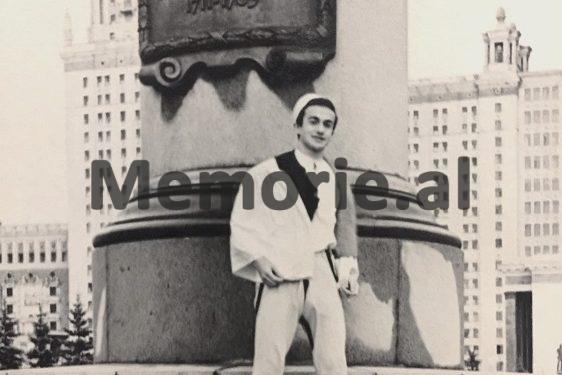By Sokrat Shyti
Part Sixty-Three
Memorie.al /The writer Sokrat Shyti is the “great unknown” who for several years has shown the tip of the iceberg of his literary creativity. I say this based on the limited number of his published books in recent years, mainly the voluminous novel “The Ghost Night” (Tirana 2014). The novels: “BEYOND MYSTERY,” “BETWEEN TEMPTATION AND WHIRLPOOL,” “THE DIGGING OF NIGHTMARES,” “THE SHADOW OF SHAME AND DEATH,” “COLONEL MAIN HAND,” “THE FADING HOPES,” “THE TWISTS OF FATE” I, II, “SURVIVAL IN THE COWSHED,” as well as other works, all novels with 350 – 550 pages, are in manuscripts waiting to be published. The dreams and initial enthusiasm of the young novelist, returning from studies abroad full of energy and love for art and literature, were cut short early by the harsh blade of communist dictatorship.
Who is Sokrat Shyti?
Having returned from studies at the State University of Moscow right after the rupture of Albanian-Soviet relations in 1960, Sokrat Shyti worked in “Radio-diffusion” (which at that time was located on Kavaja Street), in an editorial office with his journalist friends – Vangjel Lezho and Fadil Kokomani – both of whom were later arrested and subsequently executed by the communist regime. Besides the radio, 21-year-old Sokrat had passionate literary interests at that time. He wrote his first novel “Madam Doctor” and was on the verge of publication, but… alas! Shortly after the arrest of his friends, to fill the cup, one of his brothers, a painter, escaped abroad.
Sokrat was arrested in September 1963, and in November of that year, he was interned along with his family (his mother and little sister) in a place between Ardenica and Kolonje of Lushnje. For 27 consecutive years, the family lived in a cowshed made of reeds, without windows, while Sokrat was subjected to forced labor. During those 27 years, he was legally obliged to report three times a day to the local authority. He had no right to leave the place of internment, was deprived of any kind of documents, etc. In these conditions, amid a cowshed, he gave birth to and raised his children. Precisely from this event, or more accurately a very long story of persecution, he based his writing of the book “Survival in the Cowshed”!
Agron Tufa
Continued from the previous issue
EXCERPT FROM THE BOOK “SURVIVAL IN THE COWSHED”
One day, quite unexpectedly, we heard the news of the commissar’s “transfer”. After a week, several officers appeared in the unit like shadows, who came on foot, not by “Jeep”, specifically to check all the observation points, the material base, the armament. After completing the inspection, they left silently, just as they had come, making the visit mysterious. Commander Ali and I found this silent team strange, almost as if they were deaf and dumb, because even among themselves they talked in muffled whispers.
No matter how much we racked our brains and racked our brains over and over again about the reasons for this surprise visit, we did not reach any concrete conclusion, because we did not exchange a single word with the inspectors, and consequently we did not have a single point of support for reasoning:
While regarding the “transfer” of the commissioner, doubts were raised about his debauched behavior; we could not give any opinion about the mysterious team, so it seemed appropriate to wait to see what would happen later.
Meanwhile, the soldiers continued their routine lives, spending most of their time eating bread with grapes and cheese, without giving a damn about the officers who came and disappeared like shadows. An open pleasure was clearly read in their portraits. These people thanked God in various ways, for enabling this favorable situation after the sensational noise of the threat in the South, which brought them to the prosperity of the vineyards, moving them from the red soil, and created conditions for such a wonderful vacation, that at first they did not believe it, when they were serfs in the NBU, they were tired of working. Someone with a sharp sense of smell could even think of moving, given the fact that here they spent their time in vain, did not engage in any military or civil activity, just chewed like oxen and basked in the sun. And after a simple observation and reasoning, the idea of transferring the company to an invisible place, which would not be noticeable and would not cause major problems for the officers, began to crystallize little by little.
Because despite the fact that we were named as an artillery company, in fact we were not engaged in anything concrete. And for the Naval Forces headquarters, we were completely useless, outside the structure of the training plan, an ill-considered, even quite wrong tactical shift, which wasted a fund without providing a single penny of benefit.
Under these conditions, heated discussions were sparked among the officers of the General Staff. And in the end, this acceptable solution was found: the “parasite” company, coming from the NBU of Burrel, was to be stationed in the village of Shetaj, at the end of the Rodon peninsula (which is included in the locality of Ishmi), with the explanation that only three soldiers remained at the Rodon border post.
Although in fact there was no building in the intended place to station about fifty soldiers, there was an objection from the examiners about the inadequate living standards, expressing with irresponsible frivolity the absurd assertion that the NBU soldiers fall asleep on the sheets, they are used to sleeping in barracks. Therefore, an order was given to quickly build a barn similar to the one in the Burrel sector, with a ground floor, without a roof, covered with tin, and inside to place two rows of sailor beds along the entire length, separated by a narrow corridor in the middle.
Instead of a kitchen, a summer tent was to be erected, like those in training camps. While the toilet was not mentioned at all, considering the defecation in nature, favored by the suitable terrain, with dense mare forests. For the company commander’s residence, a narrow hut on the soft sop was sufficient, considering that there would be no objections from the one who would be assigned here as supervisor, a seasoned non-commissioned officer, almost uneducated in military schools, (who was among the beneficiaries of strange reforms in the army, because one day, according to the magic order, he woke up with the title of officer!). No one doubted that this, despite the terrible living conditions, would outwardly express his pleasure for this appointment, since he would receive a monthly salary on the verge of retirement, sitting idle from morning to dinner!
Commander Aliu was disappointed and expressed his regret that our cooperation did not last long. However, considering how our company would be reduced in the village of Shetaj, neither meat nor fish, an undefined structure, he was pleased that they transferred him to Bisht Palle, to a real military point, where he would be given the opportunity to reveal his abilities.
As far as he learned from a senior officer from his village, (and he told me this), in the village of Shetaj in Ishmi the soldiers will live a scattered life, completely free, without a training plan; Instead of the political hour, the daily press will be read, if the courier brings it, since the road is in terrible condition, in the summer you choke on dust and in the winter you can’t break the mud! According to this description, there were extraordinary travel difficulties, with physical fatigue and nervous stress, to reach the road, where cars circulate.
– “How convenient for you?” – he asked me at the end. – Would it be better to be an agent of this company, since here you have freedom of action, or to go to a regular military point”?
– “Is this your opinion, or did someone else who knows me suggest it?” – I became curious.
– “Of course, someone else’s opinion. And specifically the BUD commissar, with whom we have family acquaintances”, – added the lieutenant.
– “You, as a career officer, who knows both the local and the regular unit: what do you advise me?” – I wanted to know his opinion.
– “It is enough to remember the cries of the captain red eye, in the NBU, and give you an answer. Physical difficulties and stress are easier to cope with than being squeezed in the morass of military regulations. Which variant will you choose yourself, considering that the journalist has a loose nature, he cannot stand military regulations. You are like migratory birds…”!
The lieutenant’s prediction turned out to be correct. The virgin nature of the village of Shetaj was fantastic, filled with dense greenery: only fifty steps separated our camp from the coast, on the eastern side, while on the western shore, a green wall rose, a dense jungle forest with brambles and thorns. At the end of the peninsula, there were the ruins of Skanderbeg’s castle, built as a fortress to protect against attacks by the Ottoman hordes.
Everyone really liked this wonderful environment, not only for the impressive panoramas, which filled their lungs with the fresh air of the sea and the forest, but also for the ease of finding firewood, the nearby water source, the freedom of action, it seemed to them as if they had come here to explore the Rodon peninsula from beginning to end!
– “I wouldn’t trade this perfect place for any other, until the end of my service!” said the cook, when I asked him what it was like. “Because here I feel like I’m in a rest camp. There won’t be any commands to get up and sit down, like in Burrel. There won’t be any yelling and screaming that would erode our brains. So our ears will be at ease, and we will be our own masters and our own slaves, as they say. This is very important to me.”
When the battalion captain brought the kitchen equipment loaded on two mules, the soldiers helped unload it, and they showed themselves ready to set up the kitchen tent as soon as possible. Along with the captain came a big-headed soldier, as an escort, from Gjormi i Kurbinit, who had brought a çifteli with him, and without asking the soldiers if they wanted to listen, he started singing: “You, Albania, give me honor, give me the Albanian name”!
Then he continued with the song of Shota Galica. And when he stood for a moment, casting proud glances around, he expected to hear congratulations and applause, (according to the prediction of the captain, who was amazed by the “talent” of this born rhapsodist).
In fact, not only did he not receive any thanks, on the contrary, on the gloomy faces of the soldiers, he noticed an open expression of discontent, as if they were saying to him through their disdainful looks: “You have broken our heads with your slanderous voice! So don’t you dare start over again”! Southerners cannot stand the piercing screams of northern lute players.
(Then the soldiers were struck by something else: why did the captain take the anonymous rhapsod with him whenever he brought the supply of mules, when they openly showed their disapproval? To solve this mystery, the soldier nicknamed “Baba” took the courage and asked the captain directly, for what purpose did he give us this sample? The surprised captain was embarrassed, and gave him this answer: “Soldier Musai performs the duty of the mule keeper, as an effective of our battalion”.
This statement was enough to form the conviction that the so-called anonymous rhapsod was the special envoy of the Chief of Security of the Brigade, and an observer of the battalion commander. In a word: a spy. Therefore, whenever he approached a group of soldiers to listen to their conversation, they would interrupt him and start singing songs of longing and pain, to tell him; you have no place among us, you are undesirable!)
On the same day that the mules arrived, two hours later a military truck arrived, bringing the necessary material base for the company: blankets, sheets, towels, covers for mattresses and underlays, two bales of pressed straw and a large wheelbarrow of paper, painted with tar on both sides.
Immediately after the truck left, in order not to waste time, I told the soldiers to line up, that personal equipment would be distributed according to the list, since the mattresses and underlays had to be filled with straw and each one had to make his bed. The soldier nicknamed “Baba” approached me, and whispered to me with pride and kindness: “You, commander, have a lot of other things to do. So everything that has to do with arrangements, including your bed, don’t strain your head in vain, because these things are called “Baba” for beauty”!
Our company changed subordination: from FUD and BUD, we moved to the Laç Brigade. That’s why the supplies came from there. With the same truck arrived the company commander, the “non-commissioned officer”, a tall, skinny, unattractive looking man, dressed in winter uniform. Especially when he took off his dusty cap and wiped his dirty head with a handkerchief, he looked even uglier, like a seventy-year-old man, completely worn out!
He immediately went to the hut to see the place where he would spend the nights and spend a few hours of the day. Although the sight that appeared before his eyes left much to be desired, resembling an internment camp, it did not leave such a bitter impression on him, as he thought, considering the other side of the coin, that this was precisely where the bear would make his fortune, before all else he would have plenty of time to deal with whatever was going to be shot in his head, without any nervous or physical strain, and without completely losing his mind about the responsibility of training or military readiness.
When his cousin informed him of his new assignment, he made it clear that, apart from the distance from his family, his other privileges would remain intact: (He will not be moving from Tirana with his belongings, like the Muhajirs. He will receive his salary, clothing, and food as before, my dear! In short: What fun, what fun, that dervish has, drinking raki and eating meat!). Even the only evil, the distance from his wife, has its great good, because it frees him from the daily complaints that irritate him to the bone and irritate him with impatient humiliation, especially when she shouts at him in a harsh tone, saying: “When you know yourself that you are not a man, why do you stay at home”?!
At these moments, it’s as if she’s telling him bluntly: “Don’t let my legs disappear from my sight and let me live my life! You don’t understand that with my ladylike behavior, I’m making a big concession to you, which no other woman has ever made: when you feel like a man, once a month, come and have sex. But I’m only making this sacrifice for one night. I can’t stand having a slob around all the time, because of the smell”!
The supply captain came up to me and told me that the company commander wanted you.
– “Is there a problem, or is it just to get to know you?” – I asked him.
– “I don’t know anymore. I only follow orders. Just as I command a mule, my superiors direct me where to go…”, – he answered with a wan smile.
I presented myself military-style, according to the regulations, and waited to see what he would say to me. He was sitting on the only chair, without a hat. He looked quite ugly, like Quasimondo! That’s why at that moment the question bothered me: How does his wife feel when he lies next to her?!
After a while he raised his unpleasant eyes towards me, as if he wanted to warn me: “Even if you don’t like my appearance, you have the chance to be my right-hand man. So we will naturally cooperate with each other”!
And without further ado, he gave me the most important explanation:
– “First of all, fix it in your head, as I have fixed it: only our bosses know exactly why they brought us here. Why am I saying this? To convince the soldiers not to show signs of dissatisfaction with the living conditions, when they have their eyes in their foreheads and their minds in their heads. Considering that the tongue has no bones in its mouth, it turns wherever the brain commands it, the soldiers must be restrained, as they have certainly heard the popular proverb: ‘a wise lamb drinks the milk of two sheep, while a stubborn one drinks neither’. I believe that for you, as a journalist, I expressed myself clearly…”, – he emphasized with a tired look.
– “Regarding your concern, comrade commander, I assure you one hundred percent that the soldiers of this company have a keen sense of smell and rich life experience: they understand the situation they are in very well, they know how to determine their own behavior. From what I know of them, I guarantee that they are capable of adapting to any situation, as the case may be. They have no pretensions, they step to the rhythm of the drum”, – I replied, knowing that this was the answer he expected from me. Memorie.al




